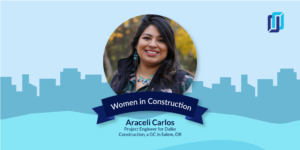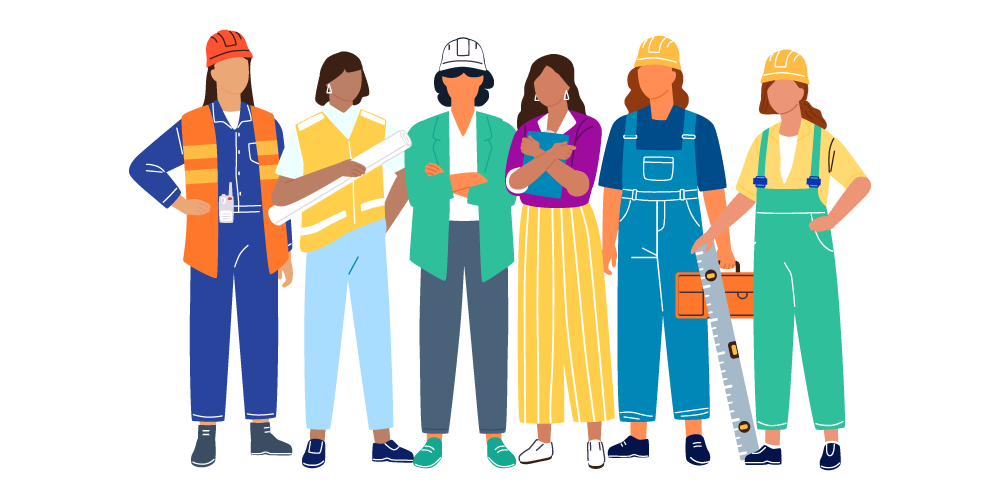
Araceli Carlos is a project engineer for Dalke Construction — a commercial general contractor in Salem, Oregon — who has been in the industry since 2008. Araceli talked with me about her career journey, the challenges she’s faced as a Latina woman in the construction industry, and the importance of supporting women making their way in engineering and construction.
Survey Results: What 1,001 Women Say About Working in Construction
Dawn: Describe what you do. What does your day-to-day work life look like?
Araceli: As a project engineer, I assist the project manager in assuring the project is completed on time, within budget, and on schedule. I’m the middle person between the superintendent, project manager, and design team, and am in charge of all the document control for the project. I spend most of my time communicating with my super and coordinating schedules, inspections, and making any contacts we need for the project.
Another thing I do here is I am the chair of the safety committee. So, safety is another big chunk of my day-to-day. I work to make sure everybody is suited up or set up correctly the first week when the project starts. I help plan everything from first aid kits to the safety plan, to tailgate meetings, to anything that requires safety on that type of project. So, we as a committee have to be there and be present to help the super figure out their plan or anything else they need assistance with.

More Women in Construction
Anne Pfleger, CIT
President, National Association of Women in Construction
Shelly Runyan
President & CEO, Titus Electrical
Tell me about your career journey: Where did you start? How did you get to the position you’re in today?
Well, it all started in high school — the thought of engineering started in high school. In elementary school, I always loved math, science, and subjects like that. Science always called out to me, in projects, science projects, and other things. Once I got into high school, I noticed there weren’t many girls in those subjects. But because of teacher support in high school, I didn’t think about that and just went ahead and did it. I graduated and went to Oregon State University for an engineering program. And that was great — at times difficult, but very rewarding.
Further reading: Mechanics Lien Rules for Architects, Engineers, and Designers
There weren’t many women there, but there had been a few women before me, years before me, and there were some new ones coming in. I wanted to touch base with those that came before to get some insight. And then I wanted to reach out to the younger women to let them know, “Hey I’m here, it’s doable.” Especially among the Latina community, because there was only a small community of Latinos in college. Then when you look at women in engineering, that’s a really small percentage. But it was a great thing that I did that, because it also got me involved with SWE, which is the Society of Women Engineers, and then that’s where I got to learn about NAWIC, National Association of Women in Construction.
After graduation, I had a few job offers, which was great. I got to choose which company I wanted to be with. After working with them for a while, the 2008 recession hit, and the company decided to close its doors. Then I took a break and got married and had my first child.
I started with Dalke in 2014 as the front office secretary. And that led to more things, including more responsibility, until eventually, I was working as a project engineer. That journey through different roles in the company was good for me because it helped me see how things worked there. I learned a lot and feel like I’m still growing.
“We confirm that we are more than women in construction. We confirm that we are doing great things in the community, and that’s what we like to do.”
Is there a person or group who has been a big source of support in your career?
I have to go back to my mom and dad. Their words of encouragement, even though they never had the educational background that I did, really helped me get through a lot of stuff. I thank God I still have them today. They have a lot to do with my go-getting attitude. They had a saying that means “work hard no matter what.” Give it your all. That’s always kept me going.
Also my husband supports me 100%. He loves construction as well, so we have great conversations. It helps me see how he sees things and it helps him to hear how I see things. We all need to have conversations like that at times. We get so busy with everything, we forget to have actual talks about some of the stuff, like how it really works. He’s a big help to me. And as a woman in construction, it’s always good to have that support.
In my professional career, I am blessed to have known a great group of ladies, part of NAWIC, Salem Chapter 198. As an organization we confirm that we are more than women in construction. We confirm that we are doing great things in the community, and that’s what we like to do. And to be part of something special.
“I was always searching for someone to look up to besides a man. I was always looking for someone like me. The truth is, I still haven’t seen one.”
Have you dealt with harassment or discrimination in the workplace?
Yes, and I have met many women who have. I know there’s going to be newbies coming in that will also. No matter what, you can’t give up. You’ve got to keep going. That shouldn’t be something that tells you, “Hey, you’re not supposed to be here.” You actually are. You just can’t control other people.
Some of the stuff that you hear in an industry like this as a woman is, “You’re not supposed to be here,” or “Go back to where you belong, in the office.” You understand that some of them don’t understand that what they’re saying is negative. They’re not saying it that way on purpose, but it takes someone to correct it.
For me, it’s not only just as a woman. I am also a Latina and have heard some things on that part as well. NAWIC has helped a lot because you feel like you’re not the only one if something like that were to happen. You hear other stories among the group and can hear how people handle certain situations and see what fits you best.
I was always searching for someone to look up to besides a man. I was always looking for someone like me. The truth is, I still haven’t seen one. We’re talking about a small percentage of women in the industry, and of that small percentage there’s an even smaller percentage of ethnic background or women of color. At some point you realize, “Well, I’ve been searching, but how about I’m the one who’s going to have to do that?”
What advice would you give to other women who are just starting out in the industry?
Always try to keep a good network. Learn as much as you can in whatever you are doing. From the smallest things to the most highlighted things, always try to do your best. When you do your best, good things are bound to happen. And if not, just keep on trying. You are actually paving the way for another woman. So be proud of that.
Join the conversation in the Levelset Community
How do you think the industry will change in the next 10 years?
What I want to see is the ratio of men and women change. More women out in the field. What I really would love, also, is to see more resources for women in the field. A lot of women are mothers. It gets hard. More resources that are easily accessible for women. Let women know: “You are welcome.”